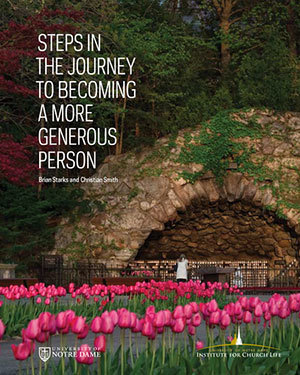
Massive catastrophes, the globally televised images of human suffering they generate, and the innate compassion of ordinary people invariably combine to unleash impressive feats of giving, but a new University of Notre Dame study suggests that generosity, at least among American Catholics, may be more complicated than that.
The study, “Steps on the Journey to Becoming a More Generous Person,” published by the Catholic Social and Pastoral Research Initiative (CSPRI) of Notre Dame’s Institute for Church Life and co-authored by Brian Starks, CSPRI director, and Christian Smith, William R. Kenan Jr. Professor of Sociology at Notre Dame, found that spontaneous givers were, as a group, less generous than their more systematic counterparts.
“We find that Catholics who are more generous are very likely to have made a prior conscious decision to give more money away and to follow routine, habitual systems of giving,” Starks said. “This suggests that, for other Catholics to become more generous, it would help to do the same.
“Concretely,” Starks continued, “American Catholics who made a conscious decision to give more money away at some prior point in their lives donated three times as much money to religious and nonreligious causes in the previous 12 months as Catholics who said that their financial giving ‘just happened.’
“Further, American Catholics who relied on systems or routines in their financial giving gave away two times as much money as those who relied instead on spontaneous or situational giving.”
“Steps on the Journey to Becoming a More Generous Person” is the second report published by CSPRI, and, as in its predecessor, “Unleashing Catholic Generosity,” Starks and Smith have used data drawn from a nationally representative survey of 1,997 U.S. adults undertaken in 2010 as a project of Notre Dame’s Science of Generosity initiative.
“In our first report,” Starks said, “we showed that when Catholics become ‘spiritually engaged’ with money, they become more likely to give to the Church. Here, we further show that Catholics who are more generous are very likely to have made a prior conscious decision to give more money away and to follow routine, habitual systems of giving. This finding suggests that, for other Catholics to become more generous, it would help to do the same. These may seem like obvious findings, but they are important to note because they underscore the need to focus on creating varied opportunities for people to make purposeful decisions to become more generous and to promote systems and practices of giving that routinize and habituate their own behavior-altering decisions.”
Contact: Brian Starks, 574-631-6109, bstarks@nd.edu